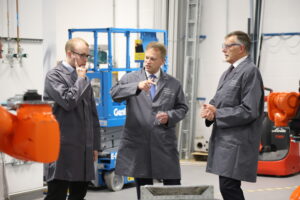
Business Secretary Grant Shapps has announced a £95 million boost to develop the super-materials of the future, supporting research and innovation in advanced materials at the Henry Royce Institute, headquartered in Manchester.
The Business Secretary visited the Royce Institute today, in what was his first official trip since assuming the role at the Department for Business, Energy and Industrial Strategy, allowing him to emphasise his strong belief that R&D investment is an important way in which to turbocharge UK economic growth, as well as celebrating Manchester’s position as an industrial powerhouse in the north of England.
The significant cash injection, awarded via the Engineering and Physical Sciences Research Council (EPSRC), cements the UK’s position as world-leader in advanced materials, and follows an initial £258m government investment made over the course of five years.
Advanced materials (including biomaterials, smart materials and nano-engineered materials) possess unique properties enabling superior performance to their traditional counterparts, and are critical in a wide range of industries including health, transport, energy, electronics and utilities.
Activities supported by Royce and backed by government funding, have included 3D bioprinting for healthcare uses such as tissue engineering in regenerative medicine, turning waste materials into sustainable plastics, and new materials to enable quantum technologies.
One project also brought together academia and industry to advance knowledge of how Zirconium alloy insulation can improve the safety and cost-efficiency of highly radioactive fuel used in nuclear reactors as well as reducing their carbon emissions. This technology could be essential to the success of Britain’s future nuclear fleet, which the government aims to ramp up in order to boost energy security and slash bills.
Another project is revolutionising the way the UK’s 35,000 tonnes of annually imported titanium, 90% of which is turned into waste during manufacturing, can be reused to create lightweight alloys used for more efficient vehicles, cutting waste and reducing emissions.
The funding announced this week will advance the Institute’s work to support early-stage research in these materials by providing financial backing, access to research facilities, and opportunities for collaboration between businesses and researchers.
Speaking during a visit to the Institute, based at The University of Manchester, the Business Secretary said “R&D investment is a critical way to turbocharge Britain’s growth. Growing an economy fit for the future means harnessing the full potential of advanced materials, making science fiction a reality by supporting projects from regenerative medicine to robots developing new recycling capabilities, right across the country – including here in the heart of Manchester.
“Today’s £95m investment will do just that, bringing together the brightest minds across our businesses and institutions to help future-proof sectors from healthcare to nuclear energy.”
The Royce was formed in 2015 with a £235 million government investment through EPSRC. To date, the Royce has worked with 295 UK SMEs and industry users and facilitated 350 collaborations between academia and industry.
Its mission is to support the growth of globally recognised excellence in UK materials research, accelerating their use in commercial settings and delivering positive, real-world impacts for our society and economy.
The use of 3D bioprinting techniques in the development and manufacture of bioengineered systems and devices for application in Tissue Engineering, Regenerative Medicine, Drug Development and other more traditional areas of healthcare
Advanced Materials and Manufacturing were identified in the government’s Innovation Strategy as one of seven technology families in which the UK has globally competitive R&D and industrial strength.
EPSRC Executive Chair Professor Dame Lynn Gladden said: “Advanced materials are crucial to driving growth across our key industries, from energy and transport to health, and ensuring they are sustainable for the future.
“This funding will build on the success of the Henry Royce Institute so far, to unleash the potential of this transformative technology for the benefit of the economy and the environment.”
TBC Professor David Knowles, Royce CEO said:“Royce and its Partners across the UK, along with the advanced materials community, is very pleased to be able to confirm this Phase ll EPSRC funding.
“Innovation in advanced materials underpins a wider range of our industrial sectors and is fundamental to our economic growth.
“Our Partnership offers a unique combination of materials science expertise, state-of-the-art laboratories and fantastic collaboration spaces for the advanced materials community.
“As we enter our Phase ll operations we are focused now, more than ever, on working with the community to identify the key challenges and opportunities ahead of us, and supporting the translation of innovative research into the viable products and systems needed to ensure a sustainable future for us all.”
Based at the University of Manchester, Royce works across the UK’s regions with academic and industry partners including Johnson Matthey, Rolls-Royce, Siemens and Tata Steel, to stimulate innovation and the development of strong local economies able to compete globally.
Stephen Phipson CBE, Chief Executive of MakeUK said: “This is a welcome announcement which recognises the world class research which takes place at this facility.
“If we are to maintain the UK’s position as a leader in research and development together with advanced manufacturing and materials then facilities like this should be at the forefront of industrial strategy.”
Read more:
New Business Secretary announces £95m funding for super-materials to boost UK growth





